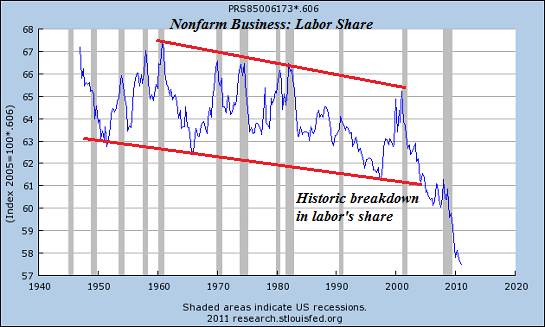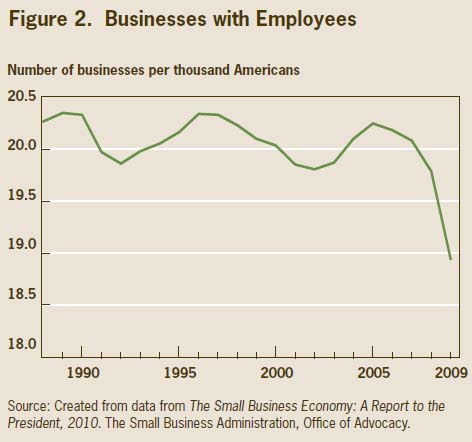Labor Day 2012: The Future of Work
Technology and the Web are destroying far more jobs than they create. We will need to develop a "Third Way" based on community rather than the Market or the State to adapt to this reality.
Over the past 15 years, the global economy has experienced structural changes to a degree not seen in nearly 150 years. Put simply, the Industrial Revolution of the 1800s has given way to a post-industrial economy. In this post-industrial economy, technology has now evolved to the point where it destroys more jobs than it creates.
Still, most people are Luddites to some extent. Human nature is to resist dramatic change, either actively or passively, until we have no other choice. If you don’t believe that, just listen to our presidential candidates.
Both Mitt Romney and Barack Obama will give us happy talk about maintaining entitlement benefits (e.g., Medicare and Medicaid) that cannot possibly be sustained. They will talk about energy self-sufficiency. They will talk about creating jobs. They will tell us that we can somehow ‘grow’ our way out of our economic distress. But neither candidate will admit that technology now destroys more jobs than it creates, because to do so would be to commit political suicide. The fact is that none of the happy talk will ever come true. Instead, the Federal Government, with the tacit approval of both major political parties, continues to run trillion-dollar-plus deficits year after year in a futile attempt to spend our way out of our economic problems and to sustain an economic model that cannot be sustained
Those who believe that bringing manufacturing back to the US will also bring back jobs are trying to fight a war that has already been fought and lost. Why? The answer is technology. It’s actually a fairly simple process now to bring production of many items back to the US, simply because of automation and robotics. A factory filled with robots can operate 24 hours a day, 7 days a week, 52 weeks a year, so long as the raw material inputs keep flowing into the factory. Robots don’t take breaks, don’t make mistakes, don’t call in sick, don’t take vacations, don’t require expensive health insurance, and don’t receive paychecks. A fully automated robotic manufacturing facility might require only 100 workers, while a traditional assembly line facility might utilize 3,000 workers. That’s a huge difference in the number of jobs. The simple fact is that most of the lost manufacturing jobs are never coming back.
What about all the marketing, administrative, accounting, and IT jobs that we think can’t be outsourced or automated? Well, retail enterprises now tailor any number of special offers directly to individual customers by mining data from reward programs. That doesn’t take an expensive ad budget or a huge marketing department, since it’s all automated. Have you ever noticed that most of the advertising you see while you surf the Web is tailored to things you might be interested in buying? That’s all automated – huge numbers of marketing professionals are just not needed.
In the accounting world, ‘lean accounting’ attempts to streamline accounting processes and eliminate accounting inefficiencies. A byproduct of ‘lean accounting’ is often greater use of technology and a significant reduction in the number of accountants and accounting clerks. In the IT (Information Technology) sector, computer algorithms for high-frequency stock trading (HFT) have become so complex that specialized software now writes new HFT programs and algorithms. That reduces job opportunities for programmers. The net result of all these examples is not job creation. It’s job destruction.
How about government jobs and government-related jobs? Well, think about the US defense budget. It’s a huge example. We surely do not need as many tanks and fighter jets as we used to, now that we have remote-controlled drones to do many of the jobs required. And with the availability of these drones, we might not need as many aircraft carriers, ships, or military personnel either. What about the Post Office? Do we really need daily mail service in an electronic world?
The point is that as we let go of old methodologies, whether in the private sector or in government, huge numbers of jobs simply disappear. As a society, we need to admit that ‘free-market’ capitalism is not going to bring back these lost jobs. Thanks to technology, society is capable of meeting basic human needs (food, clothing, shelter, transportation) with far fewer workers percentage-wise than were needed in the past. But as a society, we also need to admit that socialistic solutions won’t work either, simply because human nature is to take care of ourselves and our families first. Once we have provided for ourselves and our families, very few of us are both willing and able to provide for every stranger that might knock on our door seeking assistance.
As a nation, we must at some point address any number of major economic issues, including the massive overhang of debt (public and private) that cannot possibly be repaid and demands for future entitlement payments that cannot possibly be met. As a society, we ought to admit that we cannot borrow our way to prosperity. Unless interest rates are zero forever and creditors are willing to forego scheduled repayments forever, borrowing our way to prosperity is a mathematical impossibility.
One point is certain. Even if we find the political will to deal with the mathematics of our economic problems, we will never find long-term solutions to our economic issues until we recognize the profound economic changes wrought by technological advances. This is especially true with respect to our traditional view of a job and a paycheck. While it is true that new opportunities will always exist, these opportunities may not be as plentiful as the jobs of the past once were. And these opportunities will generally require more advanced skills than many of the jobs of the past. Technology has fundamentally changed the nature of paying work, and it is also one of the major economic issues of our time.
About the author:
Bob Z., of Vancouver, Washington, is a Corporate Finance executive who retired in 2007 from an upper management position with a Fortune 500 corporation.


 Resistance, Revolution, Liberation: A Model for Positive Change (print $25)
Resistance, Revolution, Liberation: A Model for Positive Change (print $25)(Kindle eBook $9.95)
We are like passengers on the Titanic ten minutes after its fatal encounter with the iceberg: though our financial system seems unsinkable, its reliance on debt and financialization has already doomed it.We cannot know when the Central State and financial system will destabilize, we only know they will destabilize. We cannot know which of the State’s fast-rising debts and obligations will be renounced; we only know they will be renounced in one fashion or another.
The process of the unsustainable collapsing and a new, more sustainable model emerging is called revolution.Rather than being powerless, we hold the fundamental building blocks of power. We need neither permission nor political change to liberate ourselves. A powerless individual becomes powerful when he renounces the lies and complicity that enable the doomed Status Quo’s dominance.
| Thank you, James M.($30), for your supremely generous contribution to this site-- I am greatly honored by your steadfast support and readership. |



























